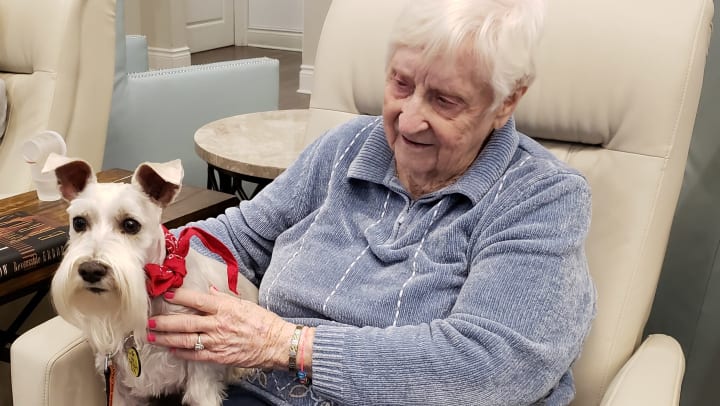Animal Assisted Therapy and the Benefits for Seniors with Dementia: Part One
Animal Assisted Therapy or AAT is defined as a therapeutic intervention that incorporates animals such as dogs, cats, horses, birds, etc. into the treatment plans for senior citizens. Research suggests that AAT can positively impact the quality of life in the elderly, specifically those living alone, fighting depression, or those in assisted living facilities. It is of course important, when considering implementing AAT into the lives of seniors to assess, such factors can include, costs and upkeep, animal training, and health factors. Making sure the animal has the proper training and all the necessary shots and vaccinations needed before entering them into the treatment plan. Over the next few entries, we will discuss the main benefits of Animal Assisted Therapy and offer some resource ideas to help get this started for the seniors in your life.
1. Increase in Physical Activity
Depending on the senior, physical activity may look different, but nonetheless research suggests that AAT does increase physical activity in seniors of all varieties. Activities such as walking the dog around the block or playing in the yard may be appropriate exercises for those who still ambulate well and have a low fall risk factor or those in assisted living facilities and memory care. For those who fall more often or have late-stage dementia, exercises may look more like feeding, brushing, or simply petting the animal. These physical interactions can increase greater mobility, reflexes, and reduce sluggishness.
2. Increase in Mental Activity
Spending time around animals also provides a mental stimulation, much like a program with seniors and children. Mental stimulation can encourage mental acuity and problem-solving skills, as well as a mental feeling of satisfaction. Such activities to provide this mental stimulation may include training of animals, teaching a new trick, or a new act of obedience.
3. Increase in Communication Skills
Research has shown that talking to animals can have many psychological benefits. Communicating with animals can be amusing for seniors, as well as cathartic and healing. This will particularly benefit those who have a quiet nature, have trouble speaking, or those who prefer solitude. Interacting with animals inevitably will call for vocal speech, but doesn’t always, making AAT a wonderful activity for even those who have lost the ability to vocalize words completely. A wonderful way to help your senior start communication within this activity will be to ask friendly questions about their therapeutic animal or perhaps their history with pets in their own home.
At Iris Memory Care, we strongly encourage families to bring pets to visit their loved ones. We also utilize pet therapy visits often in our communities. You can see pictures of pet therapy visits on our Facebook pages - check them out!


